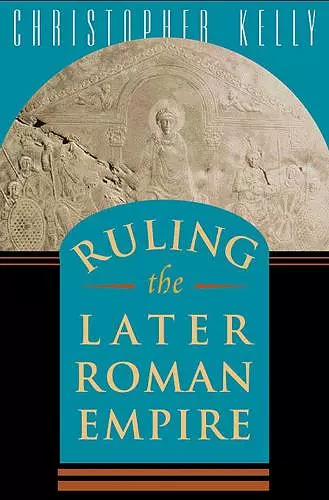Ruling the Later Roman Empire
Format:Paperback
Publisher:Harvard University Press
Published:1st Oct '06
Currently unavailable, and unfortunately no date known when it will be back

In this highly original work, Christopher Kelly paints a remarkable picture of running a superstate. He portrays a complex system of government openly regulated by networks of personal influence and the payment of money. Focusing on the Roman Empire after Constantine's conversion to Christianity, Kelly illuminates a period of increasingly centralized rule through an ever more extensive and intrusive bureaucracy.
The book opens with a view of its times through the eyes of a high-ranking official in sixth-century Constantinople, John Lydus. His On the Magistracies of the Roman State, the only memoir of its kind to come down to us, gives an impassioned and revealing account of his career and the system in which he worked. Kelly draws a wealth of insight from this singular memoir and goes on to trace the operation of power and influence, exposing how these might be successfully deployed or skillfully diverted by those wishing either to avoid government regulation or to subvert it for their own ends. Ruling the Later Roman Empire presents a fascinating procession of officials, emperors, and local power brokers, winners and losers, mapping their experiences, their conflicting loyalties, their successes, and their failures.
This important book elegantly recaptures the experience of both rulers and ruled under a sophisticated and highly successful system of government.
The Roman empire created the most remarkable administrative machines of all time. Its men and its workings are the theme of Christopher Kelly's book, compelling and enlightening for all who live under a bureaucracy and wonder how it works, and why it is as it is...Kelly [provides] a general examination of power, influence and money in the administration of the empire. The resonances with our own times are self-evident...Kelly restores the voices of the Roman dead. Here, in the 21st century, we would be wise to listen. -- Michael Bywater * Telegraph *
[A] rich, scholarly and highly informative book. -- Peter Jones * Sunday Telegraph *
Kelly sets out to examine how the much extended and professionalized bureaucracy of the Late Roman Empire actually worked...A stimulating and perceptive essay on the presumptions and procedures that informed the government of the Late Empire. -- Fergus Millar * Times Literary Supplement *
This book has been awaited since Kelly’s contributions on the subject to the Cambridge Ancient History and Bowersock, Brown and Grabar’s guide to late antiquity… Ruling the Later Roman Empire deals chiefly with the administrative and bureaucratic elites of the late empire… [Kelly] searches to find the personal and affective side of Roman bureaucracy, with great success: this is a fundamentally humane book… As one would expect from Kelly’s earlier treatments of late Roman bureaucrats, there is much of value here… Kelly’s book is destined for much approving citation in the coming years, and deserves it… That Ruling the Later Roman Empire can elicit questions fundamental to understanding the trajectory of Roman history as a whole is testament to its success. Rather than the last word on its subject, the book should be the first on many others. -- Michael Kulikowski * Bryn Mawr Classical Review *
In Ruling the later Roman Empire Christopher Kelly focuses on late Roman bureaucracy and its influence on the functioning of the empire's government...His view from the "inside" gives a unique insight into the world of late Roman bureaucrats, a world characterized by increasing complexities of the bureaucratic apparatus and an inaccessibility for those from the outside...Kelly is quite successful in his attempt to "capture something of what it was like to rule and to be ruled" in the later Roman Empire. He has skillfully managed to show the human side of late Roman bureaucracy which often seemed so impenetrable. The book will clearly be indispensable for the study of late Roman administration: it has opened up avenues that had not previously been explored. -- Danielle Slootjes * Ecclesiastical History *
- Nominated for James Henry Breasted Prize 2005
ISBN: 9780674022447
Dimensions: 235mm x 156mm x 22mm
Weight: unknown
352 pages